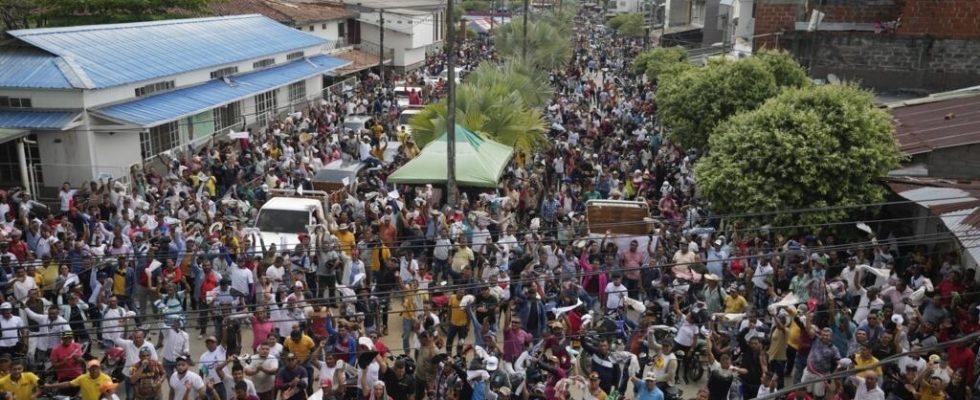Colombian President Gustavo Petro on Sunday March 19 suspended the ceasefire he had concluded on December 31 with the Clan del Golfo cartel, the country’s main drug trafficking gang.
According to the government, the organization has been intimidating and attacking villagers in the northwest of the country for more than two weeks. ” I have ordered the security forces to reactivate all military operations against the Gulf Clan “, announces Gustavo Petro on Twitter.
El attack con rifle a la fuerza available from the police por parte del clan del golfo rompe el cese al fuego.
From este momento no hay cese al fuego con el clan del golfo. La fuerza pública debe actuar de inmediato contra las estructuras de la organization mafiosa.
— Gustavo Petro (@petrogustavo) March 19, 2023
” We will not let them continue to sow concern and terror in the communities “, adds the Colombian president.
Illegal gold mines
The government notably accuses the Clan del Golfo of being behind the protest movement of miners in the Bajo Cauca, in the west of the country. Illegal mine workers have been protesting since the beginning of March against the operations carried out by the military and the police which destroy the machines with which they extract gold. Remember that the extraction of gold is a source of significant pollution of waterways, particularly due to the mercury used to amalgamate the gold particles. There have been armed clashes with the police and the government suspects the clan of not having ceased its cocaine and gold trafficking and of encouraging the climate of violence.
Incineration of 6 vehicles in the western part, between Valdivia and Caucasia, and the hostigamiento con rifle a unidades de la fuerza pública. Protesta Pacífica?? pic.twitter.com/Mplbm7fL4t
— Aníbal Gaviria Correa (@anibalgaviria) March 19, 2023
President Petro accuses the Gulf Clan of prioritizing profits from illegal gold over peace talks and claims they have taken advantage of the ceasefire to increase their presence in illegal mines. According to official estimates, the Gulf cartel is responsible for 30-60% of drug exports from Colombia, the world’s largest producer of cocaine.
The clan appointed lawyers a few weeks ago to begin discussions with the government. But he demanded to be recognized at the same level as the ELN guerrillas, to whom the government recognized political organization status in these peace talks. In addition, the Attorney General refused to suspend the capture orders that had been issued against the representatives of the clan to participate in the negotiations.
Gustavo Petro’s entourage was not always in favor of this outstretched hand policy launched last December. The Clan del golfo is known for its exactions and for cutting off the areas under its control, practicing what it calls “social cleansing”.
All-out peace?
Upon coming to power, Gustavo Petro launched an ambitious “total peace” project aimed at ending violence in the country after more than fifty years of internal war. On December 31, the Colombian government had announced a bilateral ceasefire with the Clan del Golfo, but also the guerrillas of the National Liberation Army (ELN, Guevarist), the dissident groups of the former Marxist guerrillas of the FARC (Segunda Marquetalia and Central Staff), which did not sign the 2016 peace agreement, and paramilitary groups (Gaitanist Self-Defense of Colombia) and the Sierra Nevada Self-Defense Forces). This was the first step towards a negotiation with all the armed groups in Colombia of the country’s first left-wing government.
► Read also : in Colombia, President Petro’s plan to dismantle the cartels
A construction site with four entries, one of which has therefore just closed with the breakdown of discussions with the Clan del Golfo.
(and with agencies)
